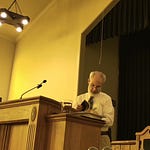Today we got a preview from a recent discussion between Gary DeMar and Douglas Wilson on eschatology. In the short clip, DeMar once again presses his familiar argument that judgment comes immediately at death, and that any future, bodily, corporate, or cosmic judgment is unnecessary. While the full conversation hasn’t been released yet, even this brief exchange reveals much about DeMar’s theological trajectory and how his framework departs from historic Christian teaching on final judgment and resurrection. It’s another reminder that his “realized” eschatology cannot withstand serious exegetical scrutiny, especially when examined against the plain teaching of Scripture.
(Side note: It was particularly amusing to watch Darren Doane, who has publicly defended Gary DeMar, react with genuine shock at the idea that a Christian might still face some form of judgment. The man could not believe he’d have to give an account for anything at all. Meanwhile, Gary nodded along with Doug Wilson, who plainly affirmed that believers will be judged; not for salvation, but for reward. Apparently, not everyone on Team Realized Eschatology is on the same page. Given Gary’s recent strategy of dismissing confessional voices because some disagree with each other, it seems only fair that we follow his lead and ignore him too, since, well, his own side isn’t unified either.)
Gary DeMar argues that the judgment described in Scripture occurs immediately when each person dies, rather than at a future Day of Judgment. When pressed about believers facing a later judgment of works, Gary repeatedly fell back on personal assertions—“I think it’s the day you die”—instead of dealing with the biblical text. This view of an instant post-mortem judgment not only ignores the context of key passages like Hebrews 9:27–28, but it also creates the very problem Gary is trying to avoid, only shifting it onto Old Testament saints.
Ignoring the Context of Hebrews 9:27–28
Gary’s position glosses over the actual structure and context of Hebrews 9. Verse 27 says, “And just as it is appointed for man to die once and after that comes judgment.” Gary seizes on this to insist judgment must fall right after each person’s death. But the very next verse (Hebrews 9:28) is joined to that thought: “so Christ, having been offered once to bear the sins of many, will appear a second time, not to deal with sin but to save those who are eagerly waiting for him.” The author deliberately links the two statements with a “just as … so” parallel. Just as people die once and afterward face judgment, so Christ died once and afterward will appear a second time. In other words, the judgment in view is tied to Christ’s second coming, not to the moment of an individual’s death. If judgment were meant to be immediately after each death, it would break this parallel, because Christ’s “afterward” (His second appearing) is clearly still future, not instantaneously after His death on the cross. The text makes no claim that judgment occurs instantly upon death; it simply indicates a general sequence (death then judgment), without specifying how soon. The emphasis is on the certainty of judgment, not its immediacy.
Gary, however, ignores this flow. In the conversation, when confronted with Paul’s teaching about a future evaluation of works (e.g. “We must all appear before the judgment seat of Christ”), Gary doesn’t offer exegesis of those passages. Instead, he repeatedly interjects “I think…” to assert that “the day” of judgment is simply the day each person dies. This move sidesteps what Paul actually taught. For instance, 1 Corinthians 3:13 says, “the Day will disclose” each one’s work, and 2 Corinthians 5:10 likewise speaks of appearing before Christ’s judgment seat. Both contexts imply an eschatological Day of Judgment, not a continuous trickle of individual judgments happening privately at each death. By saying “I think it’s the day you die,” Gary is imposing a personal conjecture onto the text, rather than drawing meaning from the text itself. It’s telling that he offers no scriptural proof that “the Day” means “the moment of death.” He simply asserts it. This is exactly the kind of eisegesis (reading one’s own idea into Scripture) that he accuses others of. In fact, Gary’s broader hyper-preterist framework forces him to reinterpret Hebrews 9:27 and these “Day” texts to fit a narrative where no future public judgment exists. But as Hebrews 9 and the rest of Scripture show, final judgment is a public event at Christ’s return, not a hidden event at each person’s demise.
The Biblical Teaching of a Future Day of Judgment
The uniform testimony of the New Testament is that God has appointed a single Day of Judgment in the future, when Christ returns in glory. Acts 17:31, for example, declares that God “has fixed a day on which He will judge the world in righteousness by a man whom He has appointed” (Jesus Christ). This is a fixed, collective Day, not an ongoing process for each individual as they die. The judgment of all humanity is portrayed as one event, carried out by the risen Christ, and its certainty is guaranteed by His resurrection. Likewise, Jesus Himself said “an hour is coming” when “all who are in the tombs will hear his voice and come out, those who have done good to the resurrection of life, and those who have done evil to the resurrection of judgment” (John 5:28–29). Here Jesus places the judgment after the resurrection of the dead, at a specific future hour when all the tombs are emptied. This is clearly not describing individual souls getting judged one by one immediately after each death, but a grand, final event. Revelation 20 paints the same picture: the dead are raised, Death and Hades give up their dead, and all stand before God’s throne for judgment together. In other words, the intermediate state (the condition of souls after death) continues until that appointed time when Christ returns and the final judgment occurs. None of these passages make sense if we collapse judgment into the moment of each person’s death. They make perfect sense, however, if we follow Hebrews 9:28’s lead: Christ will appear a second time, and then comes the full and final judgment and salvation for all on that Day.
The historic Christian witness follows the biblical pattern. The Westminster Confession of Faith (33.3) affirms that at death, the souls of the righteous are made perfectly holy and welcomed into heaven, while the wicked are cast into hell. Yet it goes on to declare that “God hath appointed a day wherein he will judge the world in righteousness by Jesus Christ... In which day, not only the apostate angels shall be judged, but likewise all persons that have lived upon earth shall appear before the tribunal of Christ, to give an account of their thoughts, words, and deeds, and to receive according to what they have done in the body, whether good or evil.” That is to say, though one’s eternal destiny is fixed at death, either in Christ or apart from Him, the public judgment and the full execution of justice remain reserved for the appointed Day at the end of the age. The Westminster Catechisms reinforce this same truth, teaching that all people will appear together before Christ after the resurrection to be openly judged. This is not an invention of confessional theology but a faithful reflection of Scripture itself: the final judgment lies ahead, bound to Christ’s return, not behind us in the hour of our death.
Gary DeMar’s immediate-judgment view stands outside this biblical and historical consensus. He voices an impatience with the idea of a delayed judgment, as if it’s an awkward redundancy. In the discussion, he basically asks: “If a Christian dies and goes to be with Jesus in heaven, and is secure in salvation, why would there be a later judgment of works? Why postpone evaluating their works until Christ returns?” But Scripture itself gives the pattern of a delayed, public judgment for God’s own wise purposes. Gary’s argument here is not based on Scripture but on personal incredulity. More ironically, his hyper-preterist framework has to accept a far greater delay in judgment for an entire class of believers: the Old Testament saints.
A Double Standard: What About the Old Testament Believers?
Gary’s system teaches that all prophecy, including the general resurrection and a general judgment, was fulfilled by AD 70. According to this view, Christ’s coming in judgment occurred at the destruction of Jerusalem. But if that were true, consider what it means for the faithful who died before AD 70. They did not receive immediate judgment or resurrection at death. Instead, they would have waited, in some cases for centuries, until that first-century event. Abraham, Moses, David, and every Old Testament saint would have remained in the intermediate state until AD 70, when, according to Gary, they were finally judged and raised. In other words, Gary’s theology requires a significant delay between death and the judgment-resurrection for everyone who died before that date. This raises the question: how is this any different from the historic Christian position, which teaches that believers now await the resurrection and final judgment at Christ’s future return? It is not different. Every difficulty Gary believes a future judgment creates, such as the saints in heaven waiting for reward, exists just as fully within his own framework. He has not eliminated the delay. He has simply shifted it earlier in redemptive history. This undermines his objection entirely. If a postponed resurrection and judgment is theologically unacceptable today, then his own system fails by the same standard.
By overlooking this, Gary applies a double standard. He worries about a Christian dying today and having to “wait” perhaps decades or centuries until Christ’s second coming for their works to be evaluated and openly rewarded. But he sees no issue with an Old Testament believer waiting in Sheol or “Abraham’s bosom” until the first century for Christ’s work to be accomplished and judgment to take place. If a deferred judgment was acceptable in God’s plan for those who died before Christ’s first coming, we have no reason to complain about a deferred judgment for those dying before Christ’s second coming. The principle is the same. In fact, Hebrews 11:39–40 notes that the Old Testament faithful did not receive the final fulfillment of the promises apart from us, because God planned something better that would unite believers across the ages. There is a continuity: all of God’s people, past and present, will see the consummation together at the final day. The hyper-preterist idea shatters this unity by claiming the consummation already happened for those prior to 70 AD, leaving post-70 believers in some entirely new scenario. Such a notion is foreign to Scripture.
In the end, Gary DeMar’s immediate-at-death judgment view is driven not by careful biblical exegesis, but by the demands of a hyper-preterist theological system that cannot allow a future global judgment. He essentially filters Hebrews 9:27 and related texts through an AD 70 lens, forcing them to say what they do not. This is why he resorts to “I think… I think…” in the face of clear passages – his personal theory is doing the steering, not the text. It is telling that Gary and others in this camp accuse traditional Reformed readers of being bound by “creedal lenses,” when in reality they themselves are bound by a novel creed of hyper-preterism.
Conclusion
The Bible teaches that after death comes judgment – ultimately, a final judgment at the return of Christ. For the believer, to die is to be immediately with the Lord in spirit, secure in salvation through Jesus. Yet Scripture also assures us of a future Day when all will stand before Christ’s throne, resurrection bodies and all, to receive according to their works (believers for rewards and public vindication, unbelievers for condemnation). This is not a contradiction or a burden to the Christian; it is a glorious promise that God’s justice will be displayed openly and our redemption completed. Gary DeMar’s insistence on collapsing this into an immediate post-mortem event has no solid biblical basis. It ignores the context of Hebrews 9 and the many passages about a collective day of judgment, and it raises inconsistencies that his own theology cannot escape (since it required saints of old to wait long for judgment). In attempting to remove what he sees as a “problem” of delayed judgment, Gary ends up ignoring Scripture and creating greater problems, such as completely redefining the doctrine of resurrection. A sound reading of God’s Word affirms that the judgment is certainly coming, but at God’s appointed time, when Jesus Christ returns in majesty to judge the living and the dead. That is the day our faith looks toward, and on that day God’s perfect justice and our full salvation will be joyfully realized.










